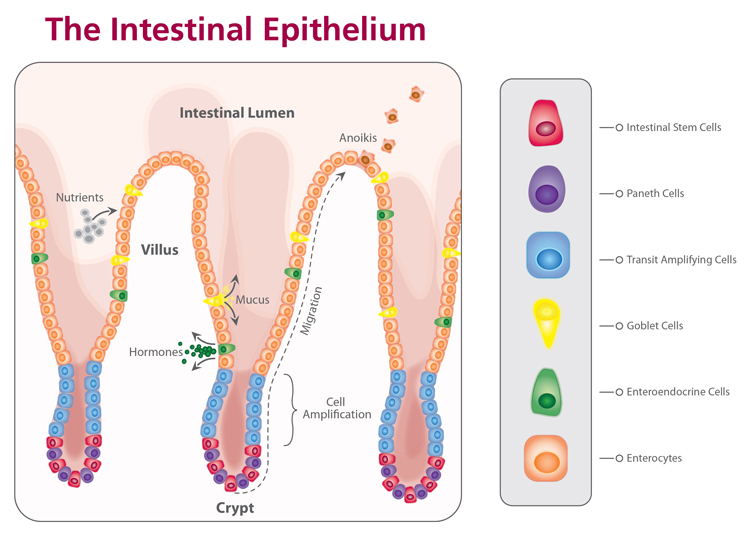The keto diet has recently become popular among people looking to improve their gut health. But there aren’t many studies looking at the safety of doing the diet long term.
There are many anecdotes on the web detailing how a keto diet has benefited people with gut problems. Many who see benefit credit either decreased fiber or increased ketones to their improvement. As it turns out, it may be both.
A new study identifies how ketones promote gut healing. This, coupled with an older study showing how fiber can be a problem, gives us a glimpse in to how a ketogenic diet promotes gut healing.
What is a keto diet?
The ketogenic diet, or keto for short, is a dietary approach that reduces carbohydrate intake. Decreasing carbohydrate intake leads to a drop in blood glucose and insulin levels. As a result, there’s an increase in fat metabolism.
The liver produces ketones as a byproduct of fat metabolism. Ketones produced by the liver circulate through the body where they’re used for energy. Cells also produce their own ketones.
Ketones are also signaling molecules that change the expression of genes. They do this through their role as Histone deacetylase (HDAC) inhibitors. And it’s through this role that they have a protective effect in the gut.

Stem cells and healing the gut
The picture above illustrates the microscopic structure of the small intestine. Notice the red cells found deep in the crypts. These are the intestinal stem cells that are responsible for regenerating your gut lining.
Intestinal stem cells give rise to the different types of cells that make up the gut. Some of these cells help us absorb our food, while others secrete hormones, mucus, and digestive enzymes.
When intestinal stem cells divide they either give birth to the new cell types or they make a carbon copy of themselves. Differentiation is the process through which daughter cells become other types of cells. But when they give birth to a carbon copy, it’s called self-renewal.
Differentiation helps replace damaged cells, while self-renewal maintains a healthy stem cell pool. A balance between the 2 is important for maintaining the regenerative capacity of the gut.

Keto diet benefits to gut health
Increased ketone production
Intestinal stem cells in the small intestine have a high capacity for making ketones. The ketone beta-hydroxybutyrate(B-OHB) plays a role in maintaining “stemness” and the regenerative capacity of intestinal stem cells. This is due to the HDAC inhibiting effect of B-OHB.
Blocking B-OHB production in intestinal stem cells decreases self-renewal and regenerative capacity. Increasing ketones via a ketogenic diet rescues the regenerative capacity of intestinal stem cells that can’t make ketones and leads to a healthier gut.
Thus, in a person with a damaged gut, a keto diet may be useful to improve gut healing. Well, at least in the short-term. There may be a dark side to this effect as some tumors derive from intestinal stem cells. So an unlimited regenerative capacity for stem cells isn’t always a good thing. This is why we need long-term studies on the topic.
Reduced fiber intake
There’s a mountain of evidence showing that a high fiber diet is good for health and longevity. However, this fails to take in to account potential downsides of a high fiber diet. Just because high fiber intake is beneficial to the population as a whole doesn’t mean everyone does well with it.
As it turns out, hiding the intestinal stem cells away in the crypts may provide a protective effect. When the microbes in our gut ferment fiber, they generate short chain fatty acids(SCFAs) such as butyrate. These SCFAs function as energy for differentiated cells in our gut. In fact, those cells prefer butyrate and suck it up.
But when exposed to butyrate, intestinal stem cells lose their regenerative capacity. In essence, butyrate causes the opposite effect of B-OHB. Fortunately the intestinal stem cells reside in the crypts which allows the differentiated cells to suck up the butyrate before it can get to them.
Unfortunately, damage and inflammation can decrease the depth of the crypts. In the presence of high butyrate, this would reduce your ability to repair damage. Thus, in a damaged gut, a shift away from a high fiber diet may be ideal.
A keto diet may provide the break needed to increase crypt depth and protect against this loss of regeneration. Conversely, a higher fiber diet may protect against hyperproliferation of intestinal stem cells. This helps explain the reduced colorectal cancer risk in people who consume a high fiber diet.
So it seems that there may be a bit of nuance to this.
Conclusion
The anecdotal evidence on the keto diet for gut problems is pretty impressive. We definitely need some long term studies on the efficacy and safety of a prolonged ketogenic diet for gut problems and overall health.
However, simply providing symptomatic relief in the short term isn’t cause for calling the keto diet a cure. That isn’t to say that people who are seeing real benefit to a keto diet should immediately stop right now. But, caution should be applied when making the decision to stick to a keto diet long term. We just don’t know if there are problems with this approach.
Maybe the best approach is to follow a keto diet until the gut is healed and then begin reintroducing fiber and carbs to tolerance. That certainly seems, on paper, to be the more balanced approach.
One thought on “How the keto diet improves gut health”